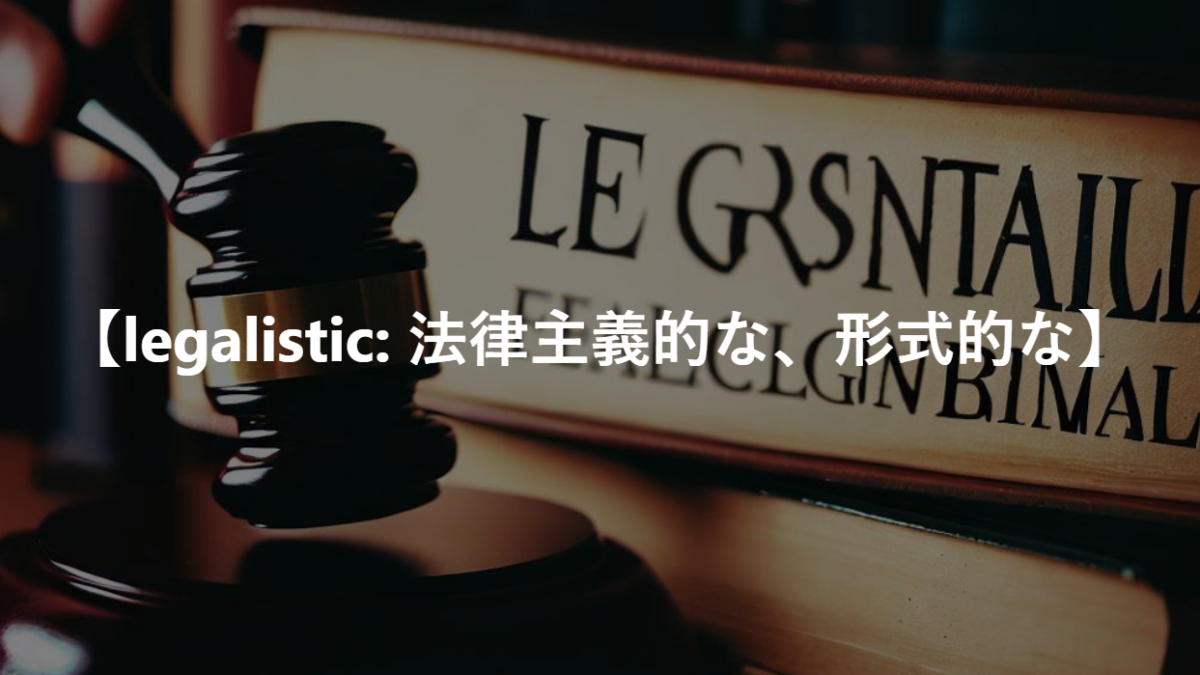語源・類義語・反対語・例文
【legalistic: 法律主義的な、形式的な】という単語の語源とか由来を知っていますか?
「Legalistic」は、「legal」(法律の、合法的な)という単語に由来し、それ自体がラテン語の「legalis」から来ています。「Legalis」は「lex」または「legis」(法律)に由来し、「法」や「規則」に関連するものを意味します。「-istic」は形容詞を形成する接尾語で、特定の傾向や方法を示します。
したがって、「legalistic」はもともと、法律や規則に厳密に従う態度や方法を指す言葉として使われるようになりました。この単語は、法律や規則を文字通りに解釈し、適用することを重視する態度、またはそのような解釈や適用に過度に依存する傾向を表すのに使用されます。
現代では、「legalistic」は、法律の精神よりも文字を優先する、形式的で硬直的なアプローチを批判的に指摘する際に使われることがあります。また、法律や規則を遵守することに対する過度な注目や、法律的な手続きに対する厳格な依存を意味する場合もあります。
“Legalistic” originates from the word “legal” (pertaining to the law, lawful), which itself comes from the Latin “legalis.” “Legalis” derives from “lex” or “legis” (law), meaning things related to law or rules. The suffix “-istic” is used to form adjectives indicating a specific tendency or method.
Therefore, “legalistic” originally referred to an attitude or method that strictly adheres to laws and regulations. This word is used to describe an approach that emphasizes a literal interpretation and application of laws and rules, or a tendency to overly rely on such interpretations and applications.
In contemporary usage, “legalistic” can be employed critically to point out a formalistic and rigid approach that prioritizes the letter over the spirit of the law. It may also imply an excessive focus on adhering to laws and regulations or a strict dependence on legal procedures.
この単語の類義語・反対語を教えてください。
類義語
- Doctrinaire: 教条的な。固い原理原則に基づいて行動することを指し、しばしば柔軟性がないことを意味します。
- Pedantic: 小うるさい。細部にわたる過度の注意や、学識を誇示する態度を指します。
- Formalistic: 形式主義的な。形式や規則を守ることに重点を置き、内容よりも形式を優先する傾向があります。
- Rigorous: 厳格な。非常に厳しい基準や規則に従うことを指します。
反対語
- Flexible: 柔軟な。状況に応じて適応し、変更する能力があることを意味します。
- Pragmatic: 実用的な。理論や原則よりも実際の結果や効果を重視するアプローチです。
- Liberal: 自由主義的な。開放的で、伝統的な制約から自由な考え方や行動を指します。
- Adaptable: 適応性のある。異なる条件や環境に容易に適応できる特性を持つこと。
似た単語で間違いやすい単語はありますか?
- Literal: 文字通りの。この単語は、テキストや発言をそのまま、比喩や象徴などを考慮せずに理解することを指します。「Legalistic」が法律や規則の厳格な適用を意味するのに対し、「Literal」は一般的な言葉や表現の直接的な解釈を指します。
- Formalistic: 形式主義的な。「Formalistic」も「Legalistic」と同様に、形式やルールに厳密に従うことを意味しますが、より広い範囲での形式や構造に関連して使われることが多いです。一方、「Legalistic」は特に法律の文脈において使用されます。
- Rigorous: 厳格な。「Rigorous」は一般に、厳密な基準や条件を適用することを指します。法律の文脈だけでなく、科学的研究や学問的な議論など、より広い範囲で使われることがあります。「Legalistic」が法律や規則への固執を意味するのに対し、「Rigorous」は方法論や基準の厳密さを指します。
この単語を使った例文をいくつか教えてください。
The legalistic approach focuses on strict adherence to the letter of the law.
(法律主義的なアプローチは、法の文字通りの厳格な遵守に焦点を当てています。)
The legalistic interpretation of the contract led to a lengthy dispute between the parties involved.
(契約の法的解釈により、関係者間で長期にわたる紛争が生じました。)
The company’s legalistic policies and procedures often hindered innovation and flexibility.
(企業の法的主義的な方針や手続きは、しばしばイノベーションや柔軟性を阻害しました。)
The judge took a legalistic approach to the case, carefully analyzing each aspect of the law before making a decision.
(裁判官はこの事件に法的主義的なアプローチを取り、判断を下す前に法律の各側面を注意深く分析しました。)
The legalistic nature of the legislation resulted in unintended consequences and loopholes.
(法律の法律主義的な性格が、予期しない結果や抜け穴をもたらしました。)
【legalistic: 法律主義的な、形式的な】のコロケーション
- Legalistic approach: 法律主義的なアプローチ
- 問題解決や意思決定において、法律や規則の文字通りの解釈を優先する方法を指します。このアプローチは、法の精神よりも文字を重視する傾向があります。
- Legalistic interpretation: 法律主義的な解釈
- 法律文書や規則を解釈する際に、文字通りまたは形式的な意味を重視する方法。この解釈はしばしば、より広い文脈や目的を無視することになります。
- Legalistic language: 法律主義的な言語
- 法律文書や契約などでよく見られる、厳格で形式的な言い回しや用語の使用。この言語スタイルは、専門性が高く、一般の人々には理解しにくいことが多いです。
- Legalistic mindset: 法律主義的な考え方
- 法律や規則に対して極めて厳格な態度を持ち、常に法的な枠組み内で物事を考える傾向。この考え方は、柔軟性が低く、創造的な解決策を見出しにくいことがあります。
- Legalistic procedures: 法律主義的な手続き
- 法律や規則に基づいた形式的なプロセスや手続き。これらは通常、非常に細かい規定やガイドラインに従う必要があり、しばしば時間がかかります。
「Legalistic」(法律主義的な、形式的な)という形容詞は、法律や規則に対するアプローチや解釈、言語使用、考え方、そして手続きの方法に関連してよく用いられます。この単語を含む表現は、特定の文脈における厳格さや形式主義を示すために使用されます。
**法律主義的なアプローチ(Legalistic approach)**は、問題解決や意思決定において法律や規則の文字通りの解釈を優先する方法を指します。このアプローチは法の精神よりも文字を重視し、しばしばより広い文脈や目的の考慮を欠くことがあります。
**法律主義的な解釈(Legalistic interpretation)**は、法律文書や規則を解釈する際に文字通りまたは形式的な意味を重視する方法を示します。このような解釈は、法律の背後にある広い意図や目的から離れる傾向があります。
**法律主義的な言語(Legalistic language)**は、法律文書や契約などで使用される厳格で形式的な言い回しや用語を指します。この言語スタイルは専門的で理解しにくいと感じられることがしばしばです。
**法律主義的な考え方(Legalistic mindset)**は、法律や規則に対して極めて厳格な態度を持ち、すべてを法的な枠組み内で考える傾向を示します。この考え方は、柔軟性や創造的な解決策を見出しにくいという欠点があります。
**法律主義的な手続き(Legalistic procedures)**は、法律や規則に基づく形式的なプロセスや手続きを指します。これらの手続きは細部にわたる規定に従う必要があり、しばしば時間がかかります。
これらのコロケーションを通じて、「legalistic」がどのように法律や規則に対する厳格かつ形式的な態度や方法を指し示すかが明らかになります。これらのアプローチは法的な正確性を確保する上で重要ですが、同時に柔軟性や創造性の制限につながる可能性もあるため、適用する際にはバランスの取れた視点が必要です。
The adjective “legalistic” is commonly used in relation to approaches, interpretations, language usage, mindsets, and procedural methods concerning laws and regulations. Expressions containing this word are employed to indicate strictness or formalism in specific contexts.
A legalistic approach refers to prioritizing the literal interpretation of laws and regulations in problem-solving or decision-making. This approach emphasizes the letter over the spirit of the law, often neglecting broader contexts and purposes.
A legalistic interpretation denotes a method of interpreting legal documents or regulations with an emphasis on their literal or formal meaning. Such interpretations tend to diverge from the broader intentions or purposes behind the laws.
Legalistic language points to the strict and formal expressions or terminology used in legal documents or contracts. This style of language is often seen as specialized and difficult to understand.
A legalistic mindset signifies a tendency to have an extremely strict attitude towards laws and regulations, considering everything within a legal framework. This way of thinking may hinder flexibility and the finding of creative solutions.
Legalistic procedures refer to the formal processes or procedures based on laws and regulations. These procedures require adherence to detailed regulations and often take a considerable amount of time.
Through these collocations, it becomes clear how “legalistic” indicates a strict and formal attitude or method towards laws and regulations. While such approaches are important for ensuring legal accuracy, they can also limit flexibility and creativity, thus requiring a balanced perspective when being applied.
legalisticを使った文法問題
- The lawyer’s _____ approach made it difficult to find a creative solution to the problem.
- (A) legalistically
- (B) legalistic
- (C) legalism
- (D) legalize
解答と解説: (B) legalistic
解説: 空欄には名詞approachを修飾する形容詞が入ります。legalisticは「法律主義的な、形式的な」という意味の形容詞です。
- The company’s _____ culture stifled innovation and discouraged employees from taking risks.
- (A) legalistically
- (B) legalistic
- (C) legalism
- (D) legalize
解答と解説: (B) legalistic
解説: 空欄には名詞cultureを修飾する形容詞が入ります。legalisticは「法律主義的な、形式的な」という意味の形容詞です。
- The manager’s _____ interpretation of the rules led to unnecessary delays and frustration among the team.
- (A) legalistically
- (B) legalistic
- (C) legalism
- (D) legalize
解答と解説: (B) legalistic
解説: 空欄には名詞interpretationを修飾する形容詞が入ります。legalisticは「法律主義的な、形式的な」という意味の形容詞です。
- The negotiations were hampered by the _____ approach of one of the parties, who insisted on strict adherence to the letter of the law.
- (A) legalistically
- (B) legalistic
- (C) legalism
- (D) legalize
解答と解説: (B) legalistic
解説: 空欄には名詞approachを修飾する形容詞が入ります。legalisticは「法律主義的な、形式的な」という意味の形容詞です。
- The government’s _____ policies were criticized for being overly bureaucratic and inflexible.
- (A) legalistically
- (B) legalistic
- (C) legalism
- (D) legalize
解答と解説: (B) legalistic
解説: 空欄には名詞policiesを修飾する形容詞が入ります。legalisticは「法律主義的な、形式的な」という意味の形容詞です。

